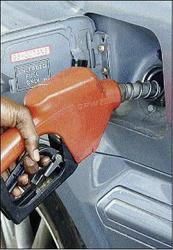Trevor G. Bennett, Contributor

A pump attendant fills a tank at a service station along Old Hope Road, St Andrew. As instability continues to affect the international oil market, surpassing the US$100-a-barrel milestone, petrol prices in Jamaica have followed suit. - Norman Grindley/Deputy Chief Photographer
January 2008 saw an explosive surge in crude oil prices - a disturbing $100 a barrel. Now, Jamaica is in, possibly, the most deep-rooted energy crisis of the era of increased energy demands and depleting natural resources.
Another disturbing fact is that Jamaica is overly dependent on imported oil for electricity generation (over 90 per cent when the average for the rest of the world is less than 10 per cent). Jamaica's lack of response to create proactive energy policies to withstand the hike in oil prices over the last 20 years has resulted in our current debacle.
In my opinion, apart from the global indicators, there are certain key elements that have led us down this road:
Lack of research and development, and failure to undertake and implement best energy management practices.
Jamaica is predominantly a consumption sector rather than production one.
The overutilisation of old power plant technologies, over 30 years old with thermo-dynamic/overall efficiencies below 30 per cent.
Poor management of electrical transmission and distribution system with over 20 per cent losses to an already inefficient system.
The mass importation of used cars from China and Japan, from the 'deportee' era of the '90s to energy-hogging SUVs.
The divestment of our railroad system, to our current inefficient mass transit system, the bus system, and further the disintegration of our country's roadways.
Poor energy management by Government. One example readily comes to our attention: the free Cuban light bulb programme and its implications.
Alternative energy is the way forward, and I agree, but before we invite proposals from foreign aides or even consider patronising our carbon credits in the inter-national market, we need to bring everything to the table. Prudent energy management has to be the alternative route for Jamaica to take. This can only be achieved through proper planning.
Energy management plan
We need to create a comprehensive energy management plan which would work coherently with a sound, workable energy policy. The plan would act as the blueprint for progress toward being an energy-efficient and partially energy independent state. What we have to do is undertake a comprehensive energy audit of the energy sector and other relevant infrastructures to see if there are energy management opportunities (EMOs) or energy conservation opportunities (ECOs) to be gained.
The first phase of the plan would be to look at the electrical generation and distribution systems, governmental buildings and infrastructures, commercial and industrial entities. Additionally, auditing the residential part of the mix would have to be executed. Arguably, this would be a very tedious, time-consuming and costly endeavour, but one that has to be done to ensure that all the opportunities can be discovered and thoroughly assessed.
Opportunities
I suspect that from the energy audit, a substantial number of EMOs and ECOs would be found. Consequently, the second phase would involve us meticulously analysing these opportunities in order to prioritise them based on economics and the ability to effectively execute.
For instance, from our power-generation system, the possibility lies that there are typical faulty equipment - inefficient turbines, pumps and boilers, leaky piping which can all add up to both thermodynamic and mechanical inefficiencies. Other EMOs might also be found in the overall operation with regards to cleaning and maintenance practices.
We also need to thoroughly investigate areas where we could retrofit our power plants and consider the redesign of the system cycles to improve efficiencies. There are certain techniques/ applications that can be utilised in the redesigning initiative - namely regeneration, reheat, preheat and cogeneration.
WASTE-TO-ENERGY facilities
The opportunity is also there for us to convert some of our existing power plants into WASTE-TO-ENERGY facilities by using municipal waste to facilitate some of our energy needs which could be a supplemental fuel to oil.
EMOs and ECOs are there to be found. Jamaica needs to find the critical ones; grab them and move forward. A lot more can be said and done, but the effort cannot solely rest with the Government. The private sector has a humongous role to play in mobilising Jamaica into an energy-efficient state.
Trevor G. Bennett is an energy management MSc graduate of the New York Institute of Technology.

